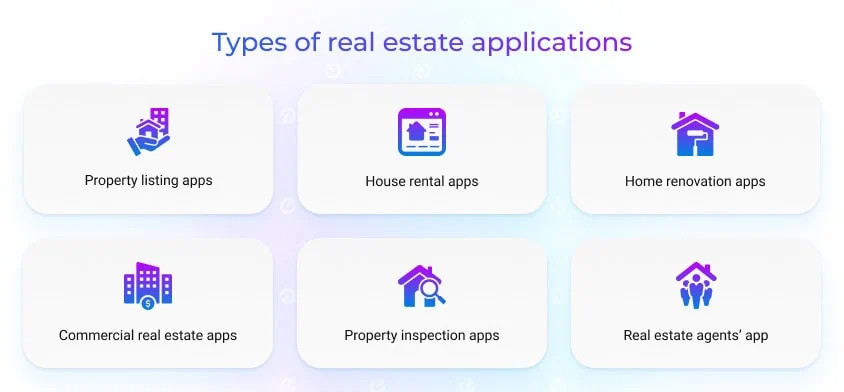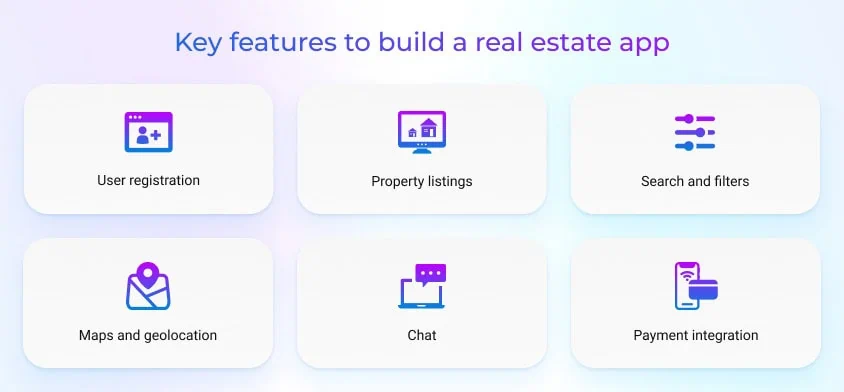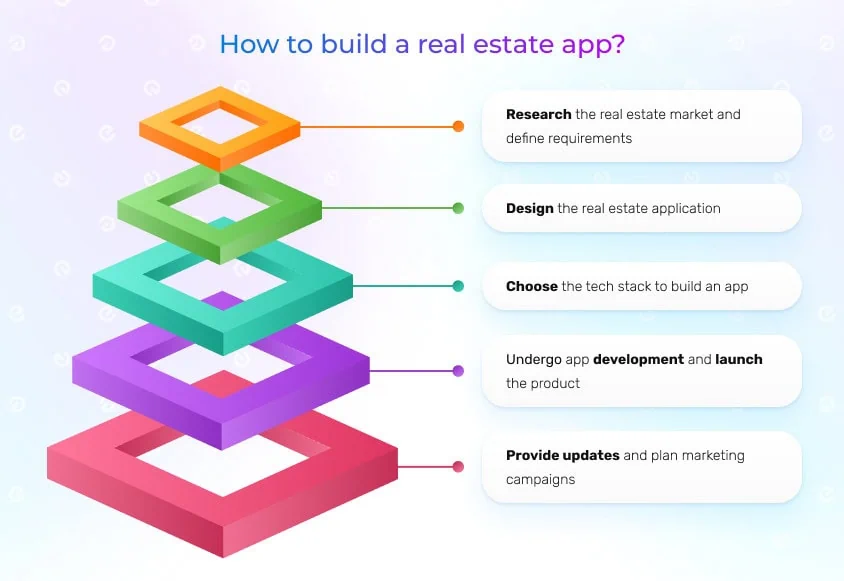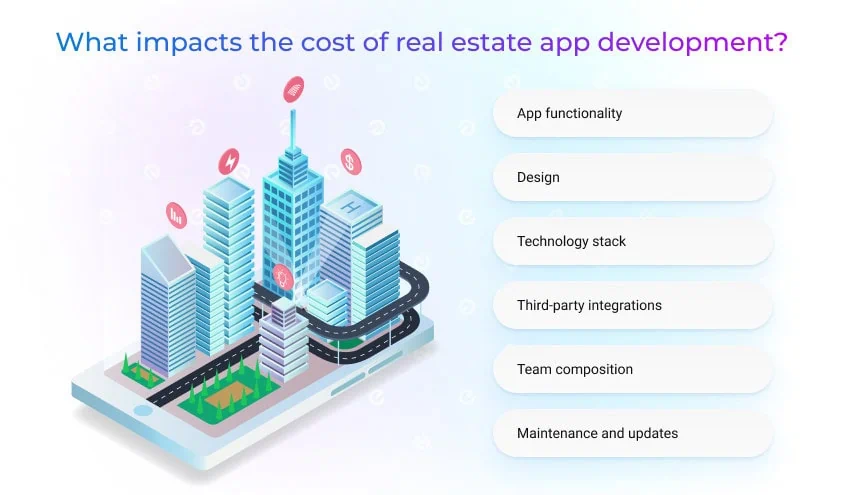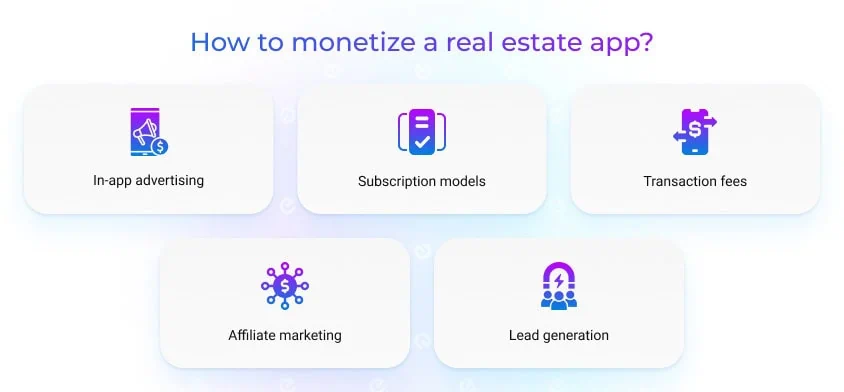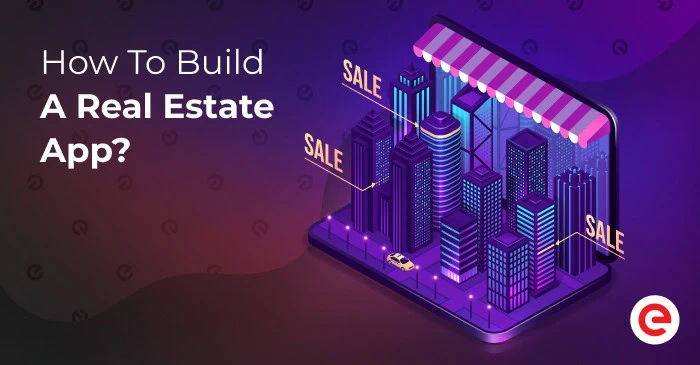
Updated: June 27, 2024
Published: June 27, 2024
How to withstand the competition in the real estate market? What solutions can you implement to captivate your users? Explore our article on real estate app development to guide you in creating successful products and services.
List of the Content
- What is a real estate mobile application?
- What real estate apps can you create?
- Key features to develop a real estate app
- How to build a real estate app?
- Real estate app development cost
- How to monetize a real estate application?
- Conclusion
WHAT IS A REAL ESTATE MOBILE APP?
The real estate software market is experiencing substantial growth and is continuing to introduce new solutions. That may sound obvious, but mobile app development for real estate is one of the increasing trends. According to the statistics, 72% of homebuyers in the US consider mobile devices as their primary source to refer to when purchasing a property. While customers favor convenience and accessibility, businesses can look for innovative approaches to advancing their services and products. Of course, it requires considerable effort, but it’s always worth a shot.
So, a real estate mobile app is designed to help users rent, sell, buy, and manage properties. Applications in this category present a wide variety of features as they can cover the needs of many stakeholders, such as buyers, sellers, real estate agents, property managers, tenants, landlords, etc.
The mobile app is a reasonable solution to advance existing services or even become a new player in the industry. Real estate mobile app development provides potential buyers and renters with convenient, on-the-go access to property listings, enhances customer engagement through interactive features, streamlines the property search process with advanced filtering and location-based services, and ultimately increases business profit opportunities.
The value proposition and exceptional functionality make real estate apps an increasingly popular choice for customers, businesses, and investors. The development teams have all the required tools to cover a variety of needs and generate new functionality ideas. They often feature virtual tours, real-time updates, personalized recommendations, neighborhood insights, price trend analysis, mortgage calculators, etc. Smooth technology integration can make property searches and real estate management more interactive, informative, and user-friendly.
Following the example of known players, businesses learn to understand the overall market landscape, identify gaps, and develop strategies to differentiate offerings. They need to look for efficient ways to anticipate trends and define the necessary app functionality. It ultimately increases the chances of success in a competitive market environment.
Understanding what makes top competitors successful helps set a standard for quality and identifies essential features that users expect. Competitors’ apps provide insights into user preferences and behaviors, guiding teams in creating a product that meets or exceeds user expectations. For instance, Zillow Group reported over 214 million unique monthly visitors across its platforms. This leading online real estate marketplace company offers a comprehensive suite of services to cover many aspects, from buying and selling to renting and financing, which adds to its popularity.
The distinct advantage of real estate app development is that businesses can focus on different app types. They have the opportunity to provide specialized features and tools tailored to each group’s specific requirements. Similar to Zillow, they can even embrace several categories, like lifestyle (Zillow Real Estate & Rentals, Zillow Rentals), productivity (Zillow Rental Manager), business (Premier Agent), finance (Mortgage by Zillow), photo & video (Zillow 3D Home), etc. This approach also helps businesses maintain a competitive edge in the real estate domain by addressing the unique needs of its varied user base. So, let’s dive into more details on various real estate types and which one to build for your business.
WHAT REAL ESTATE APPS CAN YOU CREATE?
The real estate market has always been known for fierce competition. Even when big aggregators seem to take the most share, there will always be room for innovative app ideas. The main thing is to find the right way to grasp substantial opportunities to venture into the real estate mobile app development market. So, let’s take a look at the various types of applications that you can deliver for the real estate industry. Besides, the team can always present new functionality for real estate and combine typical features based on their end-user needs.
Property listing apps
It involves delivering functional digital platforms that allow users to search, view, and manage real estate listings. A property listing application includes features for filtering properties by various criteria, viewing detailed information, and providing tools for contacting agents or property owners. It often integrates with mapping services to show the locations of properties and nearby amenities. Users can usually save their favorite listings, set up alerts for new listings matching the set criteria, and even schedule viewings directly through the app. Some advanced applications may offer virtual tours, price comparisons, and market analysis to help users make informed decisions.
House rental apps
Businesses can choose to build a digital solution to connect property owners with potential renters. It supports an excellent opportunity for users to browse available rental properties, view detailed listings with photos and descriptions, check reviews and ratings, schedule viewings, and communicate with agents, landlords, or property managers. Additionally, they may provide tools for managing rental agreements, tracking maintenance requests, handling rental payments, and offering customer support to address any issues that arise during the rental process. This advanced digital approach simplifies the rental experience, making it more convenient and efficient for renters and property owners.
Home renovation apps
Another type of real estate application is designed to help homeowners plan, manage, and execute renovation projects. Real estate app developers can feature a wide variety of tools for creating design ideas, budgeting, scheduling, sourcing materials, and hiring contractors to streamline the renovation process. Some solutions embrace the idea of quickly connecting homeowners with such local contractors as home builders, architects, design-build companies, designers, etc. The advanced app functionality often helps to visualize potential changes with augmented reality, track expenses to stay within budget, and collaborate with professionals directly through the mobile application. Additionally, these apps can provide access to a community of other users, offering inspiration, advice, and reviews to guide the renovation journey.
Commercial real estate apps
Some teams can favor building more specific apps to facilitate buying, selling, leasing, and managing commercial properties like offices or warehouses. It typically includes features for property listings, virtual tours, financial analysis, and communication tools to streamline transactions and improve efficiency for real estate professionals and clients. They commonly provide detailed property information, including location data, floor plans, and amenities. It’s essential to add analysis tools, lease tracking, contract management, etc. These apps become valuable tools to assist property managers, brokers, investors, and appraisers to optimize their processes and enhance productivity.
Property inspection apps
Various domains, including real estate, property management, and construction, can use this digital product to ensure properties are in good condition and comply with regulations. It typically includes features for creating inspection checklists, capturing photos, documenting issues, and generating reports. These apps help inspectors save time by eliminating paper-based processes and allowing for easy digital record-keeping. They often integrate with other systems, such as databases, real estate CRM, and accounting software, to provide a comprehensive inspection solution.
Real estate agents’ app
The solution typically includes features such as property search, virtual tours, mortgage calculators, and contact management tools. It is often integrated with MLS databases to provide up-to-date property information. A good practice is offering marketing tools, such as creating and distributing property listings on social media platforms, thus making it easier for agents to reach potential buyers and sellers.
KEY FEATURES TO CREATE A REAL ESTATE APPLICATION
Real estate app development involves delivering various features to enhance user experience and satisfy customers’ needs. Regardless of the chosen app type, there is a set of functionalities to be commonly added within this application category. It’s obvious that teams often come up with functionality ideas to distinguish their products. However, they also need some basis to perform the typical tasks for this domain. So, let’s focus on the list of core features to build a real estate app.
User registration
Registration enables users to create accounts where they can save property searches, receive notifications, and access personalized services within the mobile app. It helps to streamline the process of scheduling property viewings and managing inquiries. User profiles can also be used to track user activity and preferences to provide tailored property recommendations and enhance user experience.
Property listings
It’s a must-have functionality to help users browse, search, and view detailed information about properties available for sale or rent. That is a common practice to include descriptions, photos, prices, locations, and contact details for users, agents, or property owners. Additionally, the team can offer options for saving favorite listings, scheduling viewings, and receiving notifications about new properties that match the user’s preferences. This comprehensive approach helps users make informed decisions and simplifies the property search process.
Search and filters
The ultimate objective outlines the necessity of saving search time and increasing the likelihood of matching the right property. It is vital to allow customers to set their specific criteria, including location, price range, property type, or any other required attributes. This functionality focuses on streamlining the property browsing process and helping users identify suitable options efficiently. Advanced filters can be combined with map views and sorting features to provide a comprehensive and user-friendly way for potential buyers or renters to explore the real estate market.
Maps and geolocation
This functionality embraces visual and spatial information to advance search and support better decision-making. It’s a great option to view property locations on a map, see nearby amenities, and get directions. It helps users understand the geographic context of properties, including proximity to particular locations, schools, public transportation, and other points of interest. The integration of street views and satellite imagery gives a realistic perspective of the surroundings and helps assess the convenience of a property’s location.
Chat
The team has to consider the necessity of setting up a direct communication channel between users and real estate professionals within the mobile app. It facilitates quick responses to inquiries, property information sharing, and scheduling viewings. The live chat is a great option for customers to ask questions, seek advice, and receive instant responses regarding property listings, pricing, availability, and more. This feature not only streamlines the communication process but also embraces building trust and credibility. It supports personalized interactions, which can lead to better user engagement and higher chances of successful transactions or lead generation.
Payment integration
Real estate solutions often provide functionality to securely process transactions such as paying rent, booking fees, or purchasing properties directly within the app. This functionality streamlines financial operations, enhances user convenience, and ensures that payments are managed efficiently. It’s essential to support various payment methods like credit and debit cards, digital wallets, bank transfers, etc. Besides, it has to comply with all the latest regulations and security measures to protect sensitive financial information and process transactions securely.
When the choice of basic real estate app functionalities is apparent, prioritizing additional ones involves a strategic approach. The team works to present robust core features while continuously bringing additional value to users. The excellent development approach systematically prioritizes and adds nice-to-have and custom features, ensuring that each addition enhances user experience and aligns with your development resources.
| Basic features | Nice-to-have features | Custom features |
| User registration | Interactive maps |
AI-driven property recommendations |
| Property listings | Virtual tours | AR/VR for property visualization |
| Search | Geolocation | Unique functionality to meet some specific needs |
| Basic filters | Chat and messaging | |
| Extended search filters | ||
| Property comparison | ||
| Integration (MLS, payments, etc.) |
How to prioritize the functionality of your application?
Existek’s can help you identify and implement the most critical features to ensure your app meets user needs and effectively achieves your business goals.
HOW TO BUILD A REAL ESTATE APP?
As for the real estate app development process, the team commonly focuses on handling the following stages. The important thing is that each step has to be properly addressed as it remains essential to overall app success.
Step 1. Research the real estate market and define your project requirements
Any app development process starts with defining the product objectives and discovering the target audience’s needs. Businesses have to gain a clear vision of the future real estate application. Therefore, they need to understand intended user needs, learn market trends, and analyze competitors’ offers. This stage also involves listing all the functionalities and features they want to add to the real estate solution.
Step 2. Design your real estate application
Incorporating UI/UX design that enhances customer satisfaction is the right way to ensure a user-friendly and engaging real estate app. The team selects the ideal look and user experience to appeal to the target audience. It often depends on wireframes and prototypes to visualize the app’s layout and user flow. That helps tailor the design elements to meet user needs more effectively and prioritize a seamless and intuitive navigation experience to keep users engaged and reduce bounce rates.
Step 3. Choose the tech stack to build a real estate app
The team always balances various factors like the app’s requirements, budget, and timeline while choosing a technology stack. It’s vital to pick technologies to cover outlined functionality, scalability, security, third-party integrations, etc. Among the popular technologies for creating a mobile real estate app, you can find the following technologies.
- Programming languages: Swift, Objective-C, Java, Kotlin, Dart, JavaScript, C#
- Mobile app frameworks: React Native, Flutter, .NET MAUI
- Databases: MySQL, MS SQL, MongoDB, Firebase
- Cloud services: Azure, AWS, Google Cloud
- Integrations: Google Maps API, MLS APIs, payment processing and gateways
- Advanced technologies: AI and ML, AR/VR
Step 4. Undergo the development stage and launch the real estate app
It is a core phase where the development team delivers the mobile application using selected approaches and actual coding. The QA engineers are responsible for rigorous testing to identify issues and bugs. Once the application is ready for launch, the team needs to deploy the Apple App Store and Google Play Store, following the respective guidelines for app submission.
Step 5. Provide updates and plan marketing campaigns to engage users
Monitoring the app’s performance and user feedback has always been crucial. This feedback can help the team identify possible areas for improvement and new features to add. Regular updates and maintenance are required to keep your app running smoothly and competitive in the real estate market. Additionally, engaging with your user community through support channels and social media can help you build a loyal user base and gather valuable insights for future enhancements.
REAL ESTATE APP DEVELOPMENT COST
The cost of developing a real estate app can vary significantly based on the project’s specifics. It’s essential to accurately define the application’s scope and requirements and partner with a professional development team to get detailed quotes and timelines. They commonly consider the following aspects that impact the real estate app development cost.
App functionality: The complexity and number of features such as property listings, search filters, virtual tours, user profiles, messaging, and payment gateways influence the real estate mobile application development cost. Advanced features like AI-driven property recommendations or integration with third-party services will obviously increase the overall expenses.
Design: A user-friendly and visually appealing design requires more time and expertise, which affects the final cost. Custom designs, animations, and interactive elements add to the expense compared to using standard templates.
Technology stack: The chosen tech stack significantly impacts the costs of real estate app development by influencing factors such as development time, required expertise, scalability, and maintenance. A more complex or less commonly used stack may increase costs due to the need for specialized developers and longer development cycles, while a well-supported stack can reduce costs through readily available resources and streamlined development processes.
Third-party integrations: Incorporating third-party services such as payment processors, CRM systems, or real estate databases requires additional development effort and potentially licensing fees, increasing costs to build a real estate app.
Team composition: The required team’s size, expertise, and location could change the sum of the necessary cost. Hiring experienced developers, UI/UX designers, and QA engineers from regions with higher labor costs, such as North America or Western Europe, will generally be more expensive than outsourcing to areas with lower rates, such as Eastern Europe.
Maintenance and updates: Ongoing maintenance, regular updates, bug fixes, and the addition of new features post-launch are critical aspects that contribute to the app’s long-term cost.
Each of the mentioned aspects contributes to the final price of the real estate app, so make sure to take them into consideration when making your project estimates. Let’s check the approximate estimate for creating a real estate app of different complexity.
| Basic application | $45,000 – $80,000 |
| Medium complexity application | $80,000 – $120,000 |
| High complexity application | $120,000+ |
Basic real estate app cost
A simple app with essential features like property listings, search functionality, and a basic user interface can cost between $45,000 and $80,000. While functionality remains limited, it is a solid foundation for users to browse properties and contact agents.
Medium complexity real estate app cost
An app with more advanced features such as user authentication, interactive maps, property comparison, chat support, and more sophisticated UI/UX design can range from $80,000 to $120,000. Additional customizations and integrations are often included to tailor the app to specific market needs.
High-complexity real estate app cost
A fully-featured product with advanced functionalities like virtual tours, AR/VR integrations, AI-based property recommendations, CRM integration, and robust backend support can cost upwards of $120,000. The development process involves extensive custom coding, rigorous testing, and continuous updates to maintain performance and security.
HOW TO MONETIZE A REAL ESTATE APPLICATION?
The increasing popularity of introducing new real estate apps is also related to ample business opportunities, including monetization. That can be an excellent option to turn a profit due to the high demand for real estate services, the potential for recurring revenue streams, and the ability to target a specific audience. With exceptional functionality and the right marketing strategy, a real estate app can be a lucrative venture. It’s a common practice to combine various monetization options and provide some additional value to the users.
In-app advertising
It’s used to display targeted ads for different related services such as mortgage lenders, moving companies, home improvement services, and local businesses. These ads always need to be strategically placed within property listings, search results, and user dashboards to generate revenue while offering users relevant and valuable information.
Subscription models
Real estate apps often offer premium features such as advanced property search filters, early access to new listings, personalized market analysis, virtual tours, and direct communication with agents. By providing added value through these exclusive services, apps can attract users to subscribe and pay regularly for enhanced experiences and tools. Moreover, this can target both casual users and industry professionals, like property managers or real estate agents.
Transaction fees
Another monetization option is to charge users some percentage of the property’s sale or rental value when transactions are completed through the platform. This fee can be applied to buyers, sellers, landlords, or tenants, generating revenue for the app while providing convenient and secure real estate services.
Affiliate marketing
App monetization often embraces partnering with relevant businesses, such as mortgage lenders, home insurance companies, furniture retailers, moving services, etc. When app users engage with these affiliate partners through links or offers within the app, your team earns a commission on any resulting sales or services. Additionally, real estate apps can offer exclusive discounts and deals through their affiliate partners, encouraging higher engagement rates.
Lead generation
Real estate applications often link potential buyers with agents, mortgage lenders, home inspectors, or other service providers. The app can charge its partners a fee for each lead, apply a subscription fee to access a pool of leads, or earn referral commissions for successful transactions. Premium listings or advertising slots can also be sold to real estate professionals looking to increase their visibility to potential clients.
The best way to combine different monetization options within your solution is to offer a mix that provides value to users without overwhelming them. It’s important to conduct market research to understand what types of monetization models are successful in the targeted real estate domain and align them with your app’s goals and user experience. You can try testing different options to see which ones resonate best with your users and adjust your strategy accordingly to generate revenue from multiple sources while keeping customers engaged.
How to choose your app monetization strategy?
Discover more details on different monetization models and good market practices.
CONCLUSION
Real estate businesses are leveraging app development’s benefits to provide exceptional services, enrich user experiences, and foster strong relationships with their customers. In one of the most competitive domains, they need to learn how to combine industry standards and clever app ideas. The key is to focus on innovation and understanding the specific pain points of your chosen field and audience. Whether it’s offering more localized data, better user experience, or integrating cutting-edge technology like AI for property recommendations, there are numerous ways to differentiate your app. With a clear vision and a unique value proposition, your real estate mobile app can carve out its own space in the market and thrive.
Need more suggestions on implementing the app idea?
Reach out to Existek for a professional consultation. We are a software development company with first-hand experience delivering robust solutions to fulfill your special requirements.
Frequently asked questions
What are the reasons to build your own real estate app?
Developing its mobile real estate app allows the business to introduce custom solutions, cover specific user needs, enhance customers' engagement, provide a competitive edge, integrate the latest technologies, go beyond typical models, and offer control over branding and updates.
How long does it take to create a real estate mobile app?
The application development timeline typically takes 5 to 10 months, depending on the project's complexity, the development process efficiency, and the team's expertise. The timeline may be extended if your real estate app requires advanced functionality like virtual tours, integration with MLS databases, or AI-driven property recommendations.
What aspects influence the cost of real estate mobile app development?
The real estate app development costs commonly depend on the included features, project complexity, platform choice, design requirements, team composition, integration with third-party services, and ongoing maintenance and updates.
What future technology trends to expect in real estate app development?
The fast-advanced technology solutions support great opportunities with AI integration for personalized property recommendations, augmented and virtual reality for virtual tours, IoT for smart home management, big data analytics for market insights, etc.


